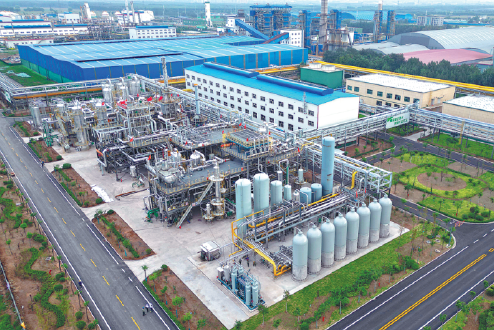

You are here 首页 > ABOUT SHANXI > Cities > Lyuliang > News
Shanxi currently boasts six filling stations and two logistic bases for the storage and transportation of the clean fuel in a number of cities
Pengfei Group, a company based in the city of Lyuliang, delivered the first batch of 100 hydrogen-fueled heavy-duty vehicles on Nov 22, marking a new milestone in the development of a hydrogen industrial chain ranging from gas production, storage and transportation to hydrogen vehicle manufacturing in the North China province of Shanxi.
Executives of Pengfei said the powertrain system and core components of the vehicles were developed by Pengfei Group and its partners nationwide.
They said one such vehicle can reduce up to 12 metric tons of carbon dioxide emissions in a journey of 10,000 kilometers, so it is expected to play a major role in China's carbon peaking and carbon neutrality initiative before 2030 and 2060 respectively.
Lyuliang city is one of the pioneers in China in the development of hydrogen as a new source of energy.
During this year's United Nations climate change conference, known as COP27, held in Sharm el-Sheikh, Egypt, on Nov 14, the practices by Lyuliang in hydrogen energy development were shared as a successful case of study among the event participants.
Lyuliang's unique development in this sector includes manufacturing hydrogen from coking gas, nurturing the hydrogen-powered automobile industry and developing hydrogen-filling facilities.
In addition to the booming development of the hydrogen industrial chain, Lyuliang has also made remarkable achievements in all fronts of sustainable growth.
With an average annual increase of 1 percent in forest coverage in recent years and constant efforts in emission and pollution control, the city now ranks among the nation's top 20 cities in terms of air quality improvement.
Its GDP has grown at an average annual rate of 5.8 percent, while the ratio of energy use to GDP fell 3.6 percent annually.
The development of hydrogen is also an important part of Shanxi's energy revolution campaign, which involves developing clean energy resources and upgrading the traditional coal-mining industry toward the directions of high efficiency and clean production.
In addition to Lyuliang, hydrogen production and other related industries have been developed in cities such as Datong, Taiyuan and Changzhi.
Local officials and industry insiders said Shanxi has unique advantages in developing the hydrogen industry.
"Hydrogen can be made through water electrolysis and extracted from coal-bed methane," said an official of the Shanxi Department of Industry and Information Technology. "But conversion from coking gas is among the most economical ways."
The official said Shanxi is now the largest coke producer in China and in the world.
"In Shanxi, coking gas, a side product of coke making with a hydrogen content of up to 60 percent, can be used to develop the largest hydrogen production industry in the world."
He estimated that Shanxi's coking plants can produce 14 billion cubic meters of hydrogen a year. The output, plus the lower cost of production in contrast with other hydrogen-producing techniques, means Shanxi's hydrogen industry, will have promising market prospects.
Zheng Peng, chairman and president of Pengfei Group, said the company is one of the pioneers in the province and even in the country in producing hydrogen from coking gas.
"Pengfei has been a comprehensive player in the coal industrial chain, from mining and coking to coal-based chemicals," Zheng said. "It was because of the cooperation with renowned Chinese scientists in the hydrogen industry that we tapped into the potential of coking gas-hydrogen conversion in recent years."
A team of experts headed by Jin Zhixin, an academician of the Chinese Academy of Engineering, is now stationed in Xiaoyi, a city under the jurisdiction of Lyuliang. It is offering tailored technological solutions for hydrogen production to local enterprises that included Pengfei.
With the help of the experts, Pengfei's hydrogen plant with an annual capacity of 20,000 tons was put into operation on July 6. It announced the completion of hydrogen-filling stations on July 21.
The total hydrogen-producing capacity of local enterprises in Shanxi has reached 40,000 tons to date. The province now has six hydrogen-filling stations and two logistic bases for the storage and transportation of the gas.
Lin Zhongqin, president of Shanghai Jiao Tong University and an academician of the Chinese Academy of Engineering, predicted the demand for hydrogen in China will reach 37 million tons in 2030, accounting for 5 percent of the country's total energy consumption.
He estimated that the demand will reach 130 million tons in 2060, accounting for 20 percent of China's total energy consumption.
Lin suggested Shanxi develop itself into a pacesetter in the industry by constructing the technological and industrial chains with the highest such level in the country.
This year, Shanxi saw the groundbreaking of nine large-scale projects in the hydrogen industrial chain, with investments totaling 13.56 billion yuan ($1.94 billion).
Zhang Guangyong, mayor of Lyuliang, said the city is expecting to develop the hydrogen industry into a pillar sector with annual output of more than 100 billion yuan.
To realize this ambition, Lyuliang is closely cooperating with 42 renowned universities and research institutions in the country to launch 90 research and development facilities in the city.
Yan Zhongxing contributed to this story.


Pengfei Group launches operation of a hydrogen-producing facility on July 6 in the Pengwan Hydrogen Port, an industrial park in Lyuliang city. WU LIUHONG/FOR CHINA DAILY

Shanxi People's Government Foreign Affairs Office (2014) All rights reserved 晋ICP备09000115号-2
Address:No.366 Yingze Street Taiyuan | Post Code:030001
TEL:+86-351-4034948 Email:service@sxfoa.gov.cn 晋公网安备 14010602060470号